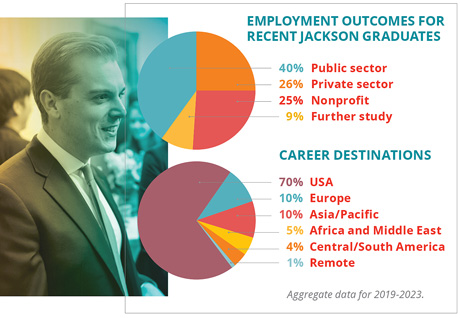Advancing a Global Affairs Career Through Graduate Education
Yale University, Jackson School of Global Affairs
Flexible Curriculum Allows Students to Follow Their Global Passions
 The most popular courses for today’s global affairs students match developments making headlines: artificial intelligence and disinformation (fake news), authoritarianism and the weakening of democracy, and the environment.
The most popular courses for today’s global affairs students match developments making headlines: artificial intelligence and disinformation (fake news), authoritarianism and the weakening of democracy, and the environment.
Master’s degree students at Yale University’s Jackson School of Global Affairs who want to study these hot topics have the advantage of a curriculum that allows them to design individualized courses of study.
“The real heart of our program is the flexibility with the curriculum,” says Elizabeth Gill, assistant dean for career development.
Of the 16 credits required for the Jackson School’s two-year Master in Public Policy in Global Affairs degree, only four are required courses. The quantitative core classes are in statistics and economics, and the social science core classes are in comparative politics and history. The remainder of a student’s coursework is structured around their career objectives. For example, someone interested in the intersection of AI, cybersecurity, and technology policy could take a multidisciplinary approach that combines coursework at the Jackson School, Yale Law School, and the Department of Computer Science.

“Whether a student is interested in the environment, development, national security, or any other global arena, they have the opportunity to take classes across the campus.” Elizabeth Gill, Assistant Dean for Career Development, Jackson School of Global Affairs, Yale University
Small by design, the master’s program graduates 35 to 40 students annually, roughly half of which are international students. Six months after graduation, 100 percent either secure a job or enroll in an advanced degree program to further their education, Gill says.
 Of graduates who take a job, 40 percent go into the public sector—the US government or the government of an international student’s home country, or a multinational organization, such as the United Nations or World Bank. For example, a 2023 graduate now works as an analysis lead for an AI task force for the UK government.
Of graduates who take a job, 40 percent go into the public sector—the US government or the government of an international student’s home country, or a multinational organization, such as the United Nations or World Bank. For example, a 2023 graduate now works as an analysis lead for an AI task force for the UK government.
The remaining 60 percent of graduates are split between the private sector and nonprofit organizations. Two examples of jobs accepted by 2023 graduates include a senior associate at the Albright Stonebridge Group consulting firm, with a focus on Latin America, and a senior strategy and policy analyst for the nonprofit MITRE Corporation, working on national security.
Students are offered numerous networking opportunities, but one advantage exists right inside the classroom, where Jackson School faculty include prominent scholars and leading global affairs practitioners, such as Ernesto Zedillo, former president of Mexico; Bisa Williams, formerly US ambassador to Niger; and retired four-star US Army Gen. David Petraeus.
“These people can make connections or write a strong letter of recommendation or give advice on the sector they are interested in,” Gill says.
Yale University, Jackson School of Global Affairs
https://jackson.yale.edu/careers
[email protected]
203-432-6253![]()
Contents
- Advancing a Global Affairs Career Through Graduate Education
- Columbia University, School of International and Public Affairs
- Yale University, Jackson School of Global Affairs
- Georgetown University, School of Foreign Service
- University of Notre Dame, Keough School of Global Affairs
- The Fletcher School at Tufts University
- Johns Hopkins University School of Advanced International Studies
- Indiana University, Hamilton Lugar School of Global and International Studies
- Seton Hall University, School of Diplomacy and International Relations